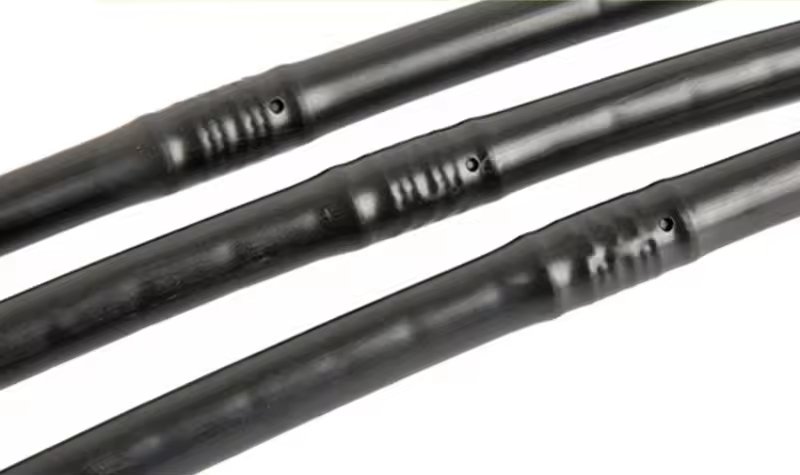

As the global demand for efficient resource utilization and environmental sustainability in agriculture grows, drip irrigation technology has emerged as a central solution to irrigation challenges. As the core component of modern agricultural irrigation systems, drip irrigation pipes play a crucial role in delivering precise water supply, conserving water resources, and boosting crop yields, especially in water-scarce regions. The widespread adoption of drip irrigation pipes is revolutionizing agricultural irrigation, helping farmers increase efficiency while reducing resource waste.
The working principle of drip irrigation pipes is simple yet highly effective. Through a network of pipes, water is slowly and evenly delivered to the roots of plants via small holes or emitters. Compared to traditional methods like sprinklers or flood irrigation, drip irrigation pipes provide water in a more targeted and efficient manner. Traditional irrigation methods often result in significant water loss through evaporation or seepage into the ground, leading to wastage of valuable resources. In contrast, drip irrigation systems maximize the efficiency of every drop, ensuring that water reaches the plant's roots directly.
This precision in water delivery makes drip irrigation pipes particularly effective in regions facing water shortages or drought. By minimizing evaporation and leakage, these systems can save 30%-50% of water compared to traditional methods. Additionally, drip irrigation allows for adjustable water flow based on the needs of different crops, ensuring optimal water supply at various growth stages. The design of drip irrigation pipes not only focuses on water conservation but also reduces the manual labor required for irrigation, bringing great convenience to farmers in their day-to-day operations.
Drip irrigation pipes are not only designed to improve agricultural productivity but also to contribute to environmental protection. Traditional irrigation methods, with their heavy water flow, can cause soil erosion, especially in sloped or erosion-prone areas, where water washes away fertile topsoil and reduces land productivity. The slow and controlled water delivery of drip irrigation systems prevents this problem by reducing surface water movement and preserving soil structure, thus preventing soil loss.
Furthermore, drip irrigation pipes improve the root environment of crops by supplying precise amounts of water, enabling better nutrient absorption. This precision also makes drip systems integral to integrated water-fertilizer management, where farmers can apply fertilizer along with irrigation, delivering it directly to the root zone. This increases fertilizer efficiency and minimizes environmental pollution caused by fertilizer runoff. In many areas, excessive fertilizer runoff contaminates groundwater or rivers, but the targeted application through drip systems reduces this risk significantly.
Drip irrigation technology was initially popularized in high-value crops like orchards and vineyards, where water needs to be managed with precision. Over time, as the technology advanced, the use of drip irrigation pipes expanded to include field crops, greenhouse plants, flowers, vegetables, and more. Whether in dryland farming or in more humid regions practicing precision agriculture, drip irrigation pipes can be adapted to meet the needs of various crops by adjusting water delivery strategies.
Globally, regions such as the Middle East, North Africa, and India, which suffer from severe water scarcity, have seen remarkable results from the adoption of drip irrigation systems. These regions face the dual challenge of climate change and prolonged droughts, but the precise water supply capabilities of drip irrigation pipes have enabled farmers to continue agricultural production with limited water resources, ensuring food security. Even in areas with abundant rainfall, drip irrigation helps reduce unnecessary water wastage and promotes sustainable agricultural production through precise irrigation management.
Drip irrigation pipes not only contribute to environmental sustainability but also provide significant economic benefits. First, the application of drip irrigation systems drastically reduces farmers' water costs, which can be a major expense in regions where water is scarce. Additionally, because water is supplied more efficiently, crops grow under optimal conditions, resulting in improved yield and quality. Farmers can increase their productivity per unit area, leading to higher profits through better harvests.
Looking to the future, the demand for sustainable agricultural practices is expected to drive further expansion of drip irrigation technology worldwide. As the technology continues to evolve, the cost of producing drip irrigation pipes is likely to decrease, making it more accessible to small and medium-sized farmers. Furthermore, with the integration of IoT technology and smart farming equipment, drip irrigation systems could become automated and remotely controlled, enhancing both irrigation efficiency and accuracy. These innovations will provide more solutions to global agricultural challenges, helping farmers adapt to climate change and resource constraints.
Drip irrigation pipes have become an indispensable tool in modern agriculture, known for their water-saving, yield-boosting, and environmentally friendly advantages. By delivering water directly to the roots of crops, drip irrigation pipes enhance water resource efficiency and reduce the problems of soil erosion common in traditional irrigation methods. The continued advancement and adoption of drip irrigation technology support the sustainable development of agriculture. In the future, drip irrigation pipes are expected to be applied in more regions and agricultural fields, driving the smart and efficient management of crop production and offering effective solutions to global water scarcity.